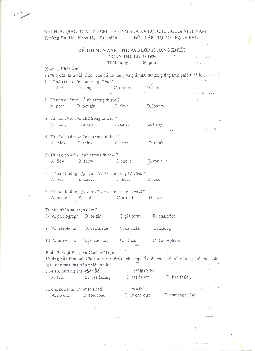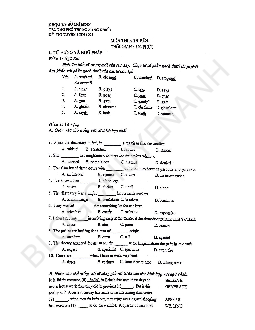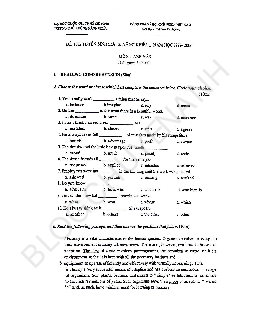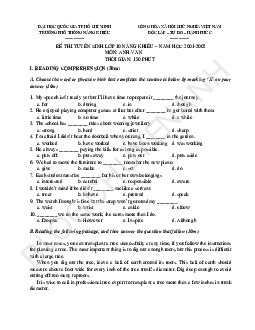










Preview text:
SỞ GIÁO DỤC VÀ ĐÀO TẠO
KỲ THI TUYỂN SINH VÀO LỚP 10 HẢI PHÒNG
THPT CHUYÊN TRẦN PHÚ NĂM HỌC 2022-2023
Môn: Tiếng Anh (Chuyên) ĐỀ THI CHÍNH THỨC
Thời gian làm bài: 150 phút, không kể thời gian giao đề
Đề thi có 06 trang
(Thí sinh làm bài ra tờ giấy thi)
Họ và tên thí sinh:……………………………………… SBD:……………………………
SECTION ONE: CONSTRUCTED RESPONSE TEST
PART ONE: LISTENING COMPREHENSION
You will hear an interview with a woman called Marta Stanson, who runs a mobile restaurant that she sets up
in different places. Listen and answer the questions by choosing the appropriate A, B, C or D . You will hear
the recording twice. (5 pts)
1.What did Marta dislike about her first job? A It was really badly paid
B. The boss didn’t listen to her
C. She had no ideas of the new dishes
D. She found the staff unfriendly
2. At first, what did Marta find most surprising about mobile restaurants?
A. They are only advertised online.
B. Customers can order their meals anywhere C Food never gets thrown away.
D. Menus can be easily changed.
3. For Marta, the best thing about mobile restaurants was____.
A. knowing she would have customers
B. being able to work outdoors
C.finding that waltera weren't needed
D. preparing all ingredients at home
4. Marta had difficulty serving food on a beach because of___ A. the noise B. the sun C. the rain D. the wind
5. Marta tries to avoid serving meals in her home because_____
A. she doesn't have enough furniture
B. the neighbours have complained C. there is a lack of space D. It provides mobile feeling
You will hear part of a talk about dolls. Listen to the talks and write ONE WORD OR A NUMBER you hear
for each answer in the spaces given. You will hear the recording twice. (10 pts) Dolls
6. The first known dolls were found in graves in___ Egypt.
7. The earliest dolls in the museum date from the____ century.
8. Early European dolls were dressed like their____
9. Dolls from the 17th century were made of____wood, and they were painted in great detail.
10. 17th-century dolls may cost as much as_____ pounds each.
11. Collectors look for examples in perfect condition, with their____ clothes.
12. 19th-century dolls had soft bodies and___ hair.
13. If you can take off the doll's hair, you may see the maker's name____.
14. Before the 20th century, all dolls were____ adults, not babies.
15. From the 1930s, dolls were made of_____.
PART TWO: VOCABULARY AND GRAMMAR
I. Give the correct form of the words in brackets to complete each of the following sentence. (10 pts)
1. Many of the heroes in our history have been (MEMORY)_____ in the names of streets.
2. The women employed in the mines were (DOMINANCE) _____young and unmarried.
3. His grandmother's good looks and youthful energy (LIE)____ her 60 years.
4. Many experts argue that students learn better when they are in classes out of choice rather than (COMPEL)________.
5. I've been given some financial advice that is (CONTRADICT)______and confusing.
6. Hundreds of (EVACUATE)____ from the war zone have arrived in the city, and the authorities are trying to find homes for them.
7. They have been waiting for the doctor's (DIAGNOSE)______ since yesterday's examination. 8. It is
(ADIVSE)______ to travel to the areas affected by radioactive pollution.
9. She stood there completely (EXPRESS)_____, so I had no idea what she was thinking about.
10. Jack got into a lot of trouble for (PERSIST)___ breaking school rules.
II. Fill each blank with a suitable preposition or adverb particle to complete each of the following sentences. (10 pts)
1. When making decisions, people tend to weigh_____ their options carefully, which is sensible as long as you
don’t _____lose sight what's important.
2. You should check all your files____the screen, then back them all____onto a storage device. 3. Asking Barry
to pay____ meals is like getting blood____ of a stone.
4. They have been struggling to rebuild the system____ the ground___ in the past 10 years.
5. The eldest son of the Queen will succeed____ the throne when she passes____
6. The journalist reported that the city was____ the brink ___a crisis.
7. I could tell___ his face that he was angry____something.
8. She is very knowledgeable______History, but she's ignorant ____Maths.
9. Rosy still failed to catch____ to what the teacher was explaining about. It was quite___ her ability
10. A teenage girl sat___ a train chewing gum and staring vacantly___ space.
III. The following passage contains 10 mistakes. Identify the mistakes and write the corrections in the
corresponding numbered boxes (0) has been done as an example. (10 pts)
0. Line 1: the a Line
DOLPHINS HAVE THEIR OWN NAMES 1
Scientists studying the species of dolphin called bottlenose dolphins has made an interesting
discovery. Each of the dolphins in the group the scientists studied has their own name, consisting of a 2
series of whistles. As many animals can copy and learn complicated sequences of sounds, few species
are capable of associating particular sounds to specific individuals or things. Dolphins use sounds 3
when they communicate for a variety of reasons, include leading other dolphins to places where food
is available and showing how friendly or aggressively they are feeling. Dolphins mainly use their 4
names, known as 'signature whistle", when they are travelling, to let the others in their group know
where are they. And when a group of dolphins comes across another group while out at sea, they 5
appear to use them like a means of greeting each other, exchanging information before the groups
join. The whistles also used when mothers and their young get separated. 6 7 8 9 10
PART THREE: READING COMPREHENSION
Read the following passage and fill each of the numbered blanks with ONE suitable word. (5 pts)
WHAT COMES FIRST ON HOLIDAY: PHONE OR FAMILY?
Passport, money, tickets; these are all essential items to pack when you're off on a family holiday. A mobile
phone, (1)_____ is a different matter, especially if everyone at work has the number. Theoretically, it (2)_____ to
be possible for stressed-out managers to have a phone free fortnight without interruptions. In reality, go to any
Mediterranean beach hotel where British families stay, and you'll be confronted by the pathetic sight of husbands
and fathers wandering around the pool (3)_____ mobile phones clamped to their ears, saying things (4)_____ :
'It's in the third drawer down, next to the pencils,' or 'I thought that contract went off last Wednesday."
To the sensitive observer, (5)______ is a tragic contrast between the beauty of the surroundings, with the family
all enjoying themselves together, and a large number of work issues under discussion. To (6)_____ matters
worse, these poor fathers probably end up paying for the call that's come between them and quality time with the
family Some, it's true, do try to resist the pull of the phone carrying it around with them but leaving it (7)____ off
until they get back to the hotel. The trouble is, they spend the whole day wondering (8)____ might have called,
and then the whole evening in a (9)_____ of frustration because everyone has now left the office and they can't
get back to them for (10)_____ sixteen hours. PART FOUR: WRITING
I.Finish the second sentence in such a way that its meaning is similar to that of the original one. (10 pts)
1. I am sure it wasn't the manager you saw yesterday because he had gone abroad. It can't
2. Although it was expected that he would stand for election, he didn't. Contrary to
3. Collecting celebrities' autographs gives the children a lot of pleasure. The children derive
4. What caused the old man to change his mind about the inheritor? What was the
5. We will stand by you whenever you're in trouble. Should
6. "I received $200,000 in bribes," he admitted. He testified to
7. Mr. Smith is the most dedicated teacher I have ever met. I've yet
8. People say that the bus driver was talking on the phone at the time of the crash.
The bus driver is said.....
9. The peculation was only brought to light after the accounts had been checked. Only after
10. I promise that I won't tell anybody what you've told me. I give you
II. Rewrite each of the sentences below in such a way that its meaning is similar to that of the original one,
using the word given in brackets. Do not change this word in any way. You must use NO MORE THAN SIX words.(5 pts)
1.Her daughter is determined to become a brain surgeon (HEART)
Her daughter has.......................................................................................... becoming a brain surgeon
2. Is it possible to walk from the hotel to the city center? (WITHIN)
Is the city center ......................................................................................... the hotel?
3. I don't mind what you wear so long as it's appropriate for the occasion. (CONSEQUENCE)
…………………………………...... what you wear so long as it's appropriate for the occasion.
4. The new salesman tried to fulfill every requirement his director had. (TUNE)
The new salesman tried to dance ……………………………………………………………
5. Given that he has no experience, will Frank be able to do this job? (AFFECT)
Will Frank's………………………………………………………... ability to do this job?
SECTION TWO: SELECTED-RESPONSE TEST PART ONE: PHONOLOGY
Mark letter A, B, C, or D to indicate the word whose underlined part is pronounced differently from that of
the others in each group. (2.5 pts) 1. A. extinguish B. exhibit C. explicit D. expansive 2. A. wretche d B. blessed C. rugged D. panicked 3. A. canary B. cadet C. canon D. casino 4. A. climbing B. doubtful C. subtle D. subtract 5. A. debris B. expertise C. alumni D. fatigue
Mark letter A, B, C, or D to indicate the word whose main stress position is placed differently from that of the
others in each group. (2.5 pts) 6. A. architectural B. enthusiasm C. anonymity D. simultaneous 7. A. inhabitable B. unprofitable C. unacceptable D. immeasurable 8. A. downpour B. downsize C. downfall D. downwind 9. A. entrepreneur B. ambassador C. indebtedness D. psychiatrist 10. A. deceitful B. aesthetic C. external D. inventory
PART TWO: VOCABULARY AND GRAMMAR
Mark letter A, B, C, or D to indicate the correct word or phrase to complete each of the following sentences. (10 pts)
11._________ , including climate, mineral content, and surface water, wetlands may be mossy, grassy, or wooded. A. Many factors depending on B. Depending on many factors C. On many factors depending D. Factors depending on many
12. _______so incredible is that these insects successfully migrate to places they have never seen.
A. What makes the monarch butterflies' migration
B. That makes the monarch butterflies' migration
C. The migration of the monarch butterflies is
D. The migration of the monarch butterflies, which is
13. I detest______ but I often have to wait for the dentist for hours to have my teeth checked. A. to keep waiting B. being kept to wait C. being kept waiting D. to be kept waiting
14. To let them see the clear change in the case, the presenter put them in the_______ A. situation B. picture C. interpretation D. plan
15. If only people in our parents' generation_____ the school facilities that we have today. A. had had B. had C. have had D. have
16. Liam and Emma want to book a table for dinner in a famous restaurant in the town.
- Liam: "We'll never get a table in there at such short notice." - Emma:"________ A. The more the merrier. B. Want a bet? C. For better for worse. D. It's on me!
17. Six novels a year, you say? He's certainly a____ writer. A. effective B. fruitful C. prolific D. fertile
18. The new speed restrictions on the highway are said to be a_____debated issue. A. heavily B. profoundly C. hotly D. deeply
PART THREE: READING COMPREHENSION Read the following passage and mark letter A, B, C or
D to indicate the correct answer to each of the questions from 31 to 40. (10 pts)
Every day, millions of shoppers hit the stores in full force - both online and on foot - searching excitedly for the
perfect gifts. Last year, Americans spent over $30 billion at retail stores in the month of December alone. Aside
from purchasing holiday gifts, most people regularly buy presents for other occasions throughout the year,
including weddings, birthdays, anniversaries, graduations, and baby showers. This frequent experience of gift-
giving can engender ambivalent feelings in gift-givers. Many relish the opportunity to buy presents because gift-
giving offers a powerful means to build stronger bonds with one's closest peers. At the same time, many dread the thought of buying
ces. gifts; they worry that their purchases will disappoint, rather than delight, the intended recipients.
Anthropologists describe gift-giving as a positive social process, serving various political, religious, and
psychological functions. Economists, however, offer a less favourable view. According to Waldfogel (1993),
gift-giving represents an objective waste of resources. People buy gifts that recipients would not choose to buy
on their own, or at least not spend as much money to purchase (a phenomenon referred to as "the deadweight loss
of Christmas"). This "deadweight loss" suggests that gift-givers are not very good at predicting what gifts others
will appreciate. That in itself is not surprising to social psychologists. Research has found that people often
struggle to take account of others' perspectives - their insights are subject to egocentrism, social projection, and
multiple attribution errors. What is surprising is that gift-givers have considerable experience acting as both gift-
givers and gift-recipients, but nevertheless tend to overspend each time they set out to purchase a meaningful gift.
In the present research, we propose a unique psychological explanation for this overspending problem, i.e. that
gift-givers equate how much they spend with how much recipients will appreciate the gift (the more expensive
the gift, the stronger a gift-recipient's feelings of appreciation). Although a link between gift price and feelings of
appreciation might seem intuitive to gift-givers, such an assumption may be unfounded. Indeed, we propose that
gift-recipients will be less inclined to base their feelings of appreciation on the magnitude of a gift than givers assume.
Why do gift-givers assume that gift price is closely linked to gift-recipients' feelings of appreciation? Perhaps
givers believe that bigger (that is, more expensive) gifts convey stronger signals of thoughtfulness and
consideration. According to Camerer (1988) and others, gift-giving represents a symbolic ritual, whereby gift-
givers attempt to signal their positive attitudes toward the intended recipient and their willingness to invest
resources in a future relationship. In this sense, gift-givers may be motivated to spend more money on a gift in
order to send a "stronger signal" to their intended recipients. As for gift-recipients, they may not construe smaller
or larger gifts as representing smaller or larger signals of thoughtfulness and consideration .
31. What is the main idea discussed in the passage?
A. Gift-recipients are widely acknowledged as considerably experienced in gift-giving.
B. Gift-giving may have certain drawbacks alongside its positive qualities.
C. Gifts can serve as Implicit signals of thoughtfulness and consideration.
D. Gift-giving, despite its uneconomical downsides, cultivates a positive social process.
32. In paragraph 4, the word 'construe" most probably means A. understand B. state C. respond D. take
33. The word 'many" in line 6 paragraph 1 refers to A. gift-givers B. peers C. presents D. gift-receipients
34. The author most likely uses the examples of gift-giving occasions in paragraph 1 to highlight the
A. regularity with which people shop for gifts
B. recent increase in the amount of money spent on gifts
C. anxiety gift-shopping causes for consumers
D. number of special occasions involving gift-giving
35. In paragraph 1, the word 'ambivalent most nearly means A. unrealistic B. supportive C. apprehensive D. conflicted
36. In paragraph 3, the author indicates that the assumption made by gift-givers may be A. insincere B. fundamental C.justified D. incorrect
37. In paragraph 4, the author refers to the works by Camerer and others in order to A. introduce an argument B. offer an alternative C. support an explanation D. question a motive
38. The social psychologists mentioned in paragraph 2 would likely describe the "deadweight loss phenomenon as A. questionable B. disturbing C. predictable D. unprecedented
39. The author indicates that people value gift-giving because they feel it_
A. functions as a form of self-expression
B. can serve to strengthen a relationship
C. is an inexpensive way to show appreciation
D. requires the gift-recipients to share the same opinion
40. Which of the following best characterizes the tone of the author? A. informative B. pessimistic C. disapproving D. ironic
Read the following passage and mark letter A, B, C, or D to indicate the correct word or phrase to complete
each of the numbered blanks from 41 to 50. (5 pts) TEENAGE AIRLINE BOSS
Martin Halstead is a young entrepreneur, best known for having managed to launch his own airline at the age of
eighteen. Martin started his first business (41) _____ , making flight simulators for use in pilot training, while he
was still a fifteen-year-old schoolboy, and at seventeen he left school to (42)_____ as a pilot. It was whilst on the
course that Martin realised that (43)____ of just being a pilot, he'd like to run an airline business, and so he
(44)_____ up with the idea for AlphaOne Airways. Martin (45) ____planned to fly between Oxford and
Cambridge, and there was considerable public (46)____ in the idea. But when a big investor (47) _____out at the
last minute, Martin was left with no option but to think again. But he was not to be (48) _____. In November
2005, he relaunched the company, this time planning flights from the Isle of Man to Edinburgh. The first flight
departed on November 7th, carrying invited guests and media in an aircraft Martin had leased from another
company. (49)____ the airline suspended operations in January 2006, AlphaOne Airways had carried some forty
fare-paying passengers on the route, and Martin had fulfilled his dream. It was perhaps his naively and youth that
allowed him to ignore the problems and barriers that someone older may have seen as a brick wall (50)____ in the way of achievement. 41. A. venture B. effort C. task D. event 42. A. train B. learn C. study D. prepare 43. A. instead B. rather C. preference D. alternative 44. A. dreamt B. thought C. hit D. came 45. A. largely B. principally C. initially D. primarily 46. A. attention B. support C. attraction D. interest 47. A. called B. checked C. pulled D. held 48. A. caught out B. sent back C. turned down D. put off 49. A. Since B. Despite C. Although D. Whether 50. A. blocking B. standing C. stopping D. Impeding
Read the following passage and mark letter A, B, C, or D to indicate the correct answer to oach of the
questions from 51 to 55. (5 pts)
A survey is a study, generally in the form of an interview or a questionnaire, which provides information
concerning how people think and act. In the United States, the best-known surveys are the Gallup poll and the
Harris poll. As anyone who watches the news during presidential campaigns knows, these polls have become an
important part of political lite in the United States. North Americans are familiar with the many "person on the
street interviews on local television news shows. While such interviews can be highly entertaining, they are not
necessarily an accurate indication of public opinion. First, they reflect the opinions of only the people who
appear at a certain location. Thus, such samples can be biased in favor of commuters, middle-class shoppers, or
factory workers, depending on which area the newspeople select. Second, television interviews tend to attract
outgoing people who are willing to appear on air, while they frighten away others who may feel intimidated by a
camera, A survey must be based on a precise, representative sampling if it is to genuinely reflect a broad range of
the population In preparing to conduct a survey, sociologists must exercise great care in the wording of
questions. An effective survey question must be simple and clear enough for people to understand. It must also
be specific enough so that there are no problems in interpreting the results. Even questions that are less structured
must be carefully phrased in order to elicit the type of information desired. Surveys can be indispensable sources
of information, but only if the sampling is done properly, and the questions are worded accurately. There are two
main forms of surveys: the interview and the questionnaire. Each of these forms of survey research has its
advantages. An interviewer can obtain a high response rate because most people find it more difficult to turn
down a personal request for an interview than to throw away a written questionnaire. In addition, an interviewer
can go beyond written questions and probe for a subject's underlying feelings and reasons. However,
questionnaires have the advantage of being cheaper and more consistent.
51. What does the passage mainly discuss?
A. The history of surveys in North America
B. The importance of polls in American political life
C. Problems associated with interpreting surveys D. The principles of conducting surveys
52. According to the passage, one advantage of live interviews over questionnaires is that live interviews A. are easier to interpret
B. can produce more information C. cost less
D. minimize the influence of the researcher
53. The word "they in paragraph 2 refers to A. North Americans B. news shows C. opinions D. interviews
54. The word "elicit" in paragraph 3 is closest in meaning to A. take out B. rule out C. leave out D. bring out
55. According to paragraph 3, which of the following is most important for an effective survey?!
A. A sociologist who is able to interpret the results B. An interviewer's ability to measure respondents' feelings C. Carefully worded questions
D. A high number of respondents
---- THE END --------
(Thí sinh không sử dụng tài liệu, cán bộ coi thi không giải thích gì thêm)




